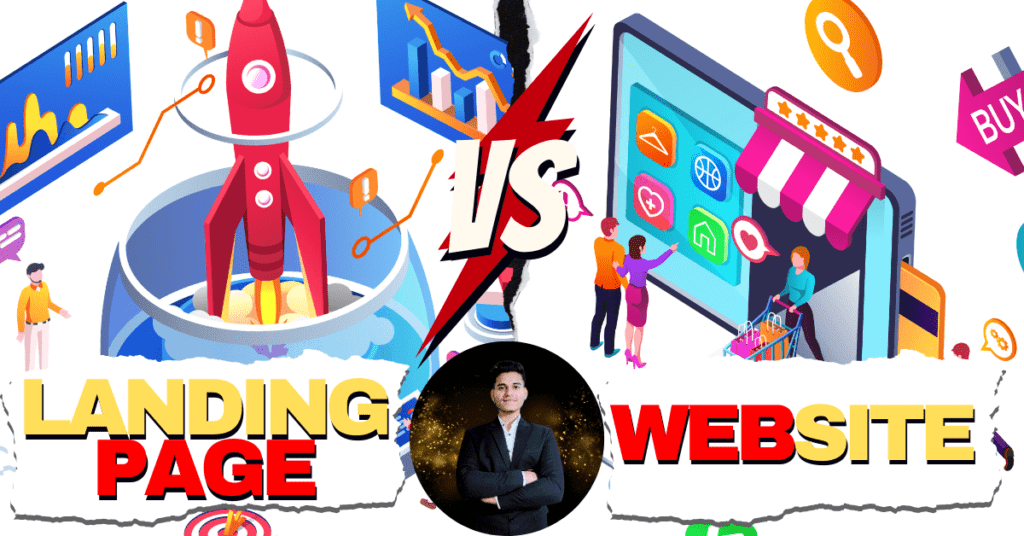Boost Your Conversion Rates – 5 Differences B/W Landing Page and Websites !

Introduction: website verse landing page
In the digital world, recognising the differences between landing pages and websites is critical. Each has a specific function, which influences user experience and online success. Let’s look at the five significant distinctions between them and how they affect your digital approach.
Defining Landing Page:
A landing page is a web page that acts as the website’s entry point or specific segment. It is created with a specific goal in mind, which is often to convert visitors into leads or customers. Landing pages are often used in online marketing and advertising campaigns to direct people to do a specific action, such as making a purchase, completing a form, or subscribing to a newsletter. These pages frequently reduce distractions and concentrate on a strong call-to-action (CTA).
Defining a Website:
A website is a collection of web pages and associated information published on a single web server under a shared domain name. It is available over the internet and usually contains information on a certain issue, organisation, company, or people. Websites can include a wide range of material and purposes, from personal blogs and informational sites to e-commerce platforms and business websites. They are intended to be seen by people using web browsers and frequently contain text, graphics, multimedia components, and interactive features.
Purpose and functionality
The fundamental difference is in their purpose. Landing pages are designed to maximise conversions by emphasising a certain product or service. In contrast, websites act as informational centres, giving detailed information about a brand’s offers, history, and ideals. Understanding their respective functions is critical for developing a strong web presence.
Design & Structure
Landing pages are frequently basic in design, directing visitors to a single main point. Websites, on the other hand, have more complex architecture, including navigation menus, several pages, and a variety of content layouts. Design should be purpose-driven – streamlined for conversions, thorough for information transmission.
Content Depth and Scope
Landing pages provide brief material, emphasising brevity to keep visitors interested. Websites, on the other hand, allow for more comprehensive content generation, such as lengthy articles, blog entries, and multimedia. The level of material is determined by the platform’s principal function, which is either conversion or information exchange.
User Interaction
Landing page interactions are often simplified, directing visitors to the desired action. Websites provide a more comprehensive user experience, with navigation choices, many touchpoints, and diverse content consumption alternatives. Understanding user behaviour is critical to optimising both types of platforms.
SEO Optimisation
Both landing pages and websites benefit from SEO, although the approaches vary. Landing pages frequently include specialised keywords relating to the conversion objective. Websites, with their diversified content, use a more comprehensive SEO strategy, optimising for a variety of keywords across several pages.
Mobile responsiveness
In a world dominated by mobile devices, responsiveness is unavoidable. Landing pages are frequently developed with mobile optimisation in mind, ensuring that they work seamlessly on smaller displays. Websites must also prioritise mobile responsiveness to accommodate the varied devices used by their audience.
Loading Speed
Landing pages prioritise loading speed for quick user interactions and conversions. Websites with more substantial content must find a balance between information richness and load speed. Optimising loading speed increases customer happiness and helps to improve search engine results.
Conversion Goals
The ultimate goal of a landing page is to increase conversions quickly. Websites have greater aims beyond conversions, such as brand exposure, engagement, and long-term consumer connections. Tailoring methods to achieve individual conversion targets is critical to success.
Analytics & Tracking
Both platforms use analytics, but their focus differs. Landing pages focus on data that are directly relevant to the conversion process, such as click-through rates and form submissions. Websites capture a greater range of data, including user behaviour across several pages, which helps to optimise overall digital strategies.
Cost and Maintenance
Because of their emphasis, landing pages typically have lesser expenses and require less upkeep. Websites, due to their complexity, may have greater starting expenses and require continuous maintenance for upgrades and optimisations. Understanding the financial and maintenance consequences is critical for decision making.
Integrations
While landing pages and websites may interface with many tools and platforms, the level to which they do so varies. Landing pages frequently work in tandem with analytics, CRM, and payment processing platforms. Websites have additional integration options due to their comprehensive nature, which improves overall functioning.
FAQs:
Absolutely! Many websites have landing pages for specific campaigns or items. These pages retain the website’s general look while focusing on a single conversion goal.
Landing pages are often connected with marketing, although they may serve a variety of functions. They can emphasise product benefits, collect user data, and advocate particular activities in addition to marketing efforts.
Landing pages help SEO by targeting certain keywords, but websites have a greater impact because of their extensive content. Both are vital for having a strong internet presence.
It depends on your objectives. Websites are versatile, but landing pages thrive at focused conversions. A planned mix frequently produces excellent outcomes.
Websites benefit from frequent changes to keep material fresh. Landing pages may require adjustments due to unique campaigns or changes in conversion methods.
Yes, websites often have greater maintenance expenses owing to their complexity and continual content revisions. Landing pages that are targeted may have cheaper maintenance costs.
conclusion:
Understanding the distinctions between landing pages and websites is critical for building a successful online presence. Whether you’re looking for targeted conversions or extensive information distribution, adjusting your digital strategy to each platform’s unique capabilities provides a holistic and effective approach.

